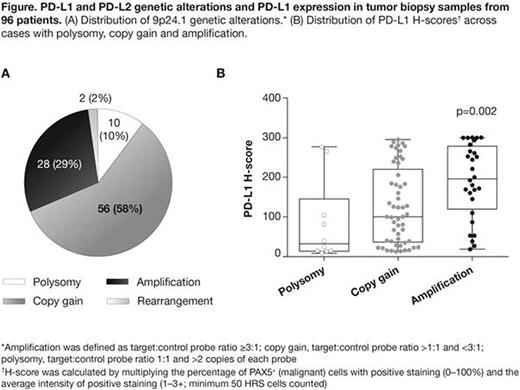Abstract

Classical Hodgkin lymphomas (cHLs) include infrequent malignant Hodgkin Reed-Sternberg (HRS) cells within an extensive but ineffective inflammatory/immune cell infiltrate. HRS cells exhibit frequent copy number alterations (CNAs) of 9p24.1/CD274 (PD-L1)/PDCD1LG2(PD-L2), ranging from low-level polysomy to relative copy gain and high-level amplification, all associated with increased expression of programmed death receptor-1 (PD-1) ligands on the tumor cell. PD-1 ligands engage the PD-1 receptor on T cells, inhibiting T cell activation and anti-tumor immune responses. cHL patients (pts) with the highest-level 9p24.1 alterations, PD-L1/PD-L2 amplification, have inferior progression-free survival (PFS) after standard primary chemotherapy (Roemer et al. J Clin Oncol 2016). Given the demonstrated responsiveness of cHL to PD-1 blockade, we examined the prevalence and type of 9p24.1 genetic alterations, PD-L1 expression, and association of these alterations with clinical outcome in pts receiving nivolumab (nivo; anti-PD-1) for relapsed/refractory (R/R) cHL.
CheckMate205 is a multicenter, multicohort, phase 2 trial of nivo in R/R cHL. This analysis focused on 2 cohorts: pts with recurrent cHL following autologous stem cell transplantation (ASCT) and subsequent brentuximab vedotin (BV) (cohort B), and pts with R/R cHL following ASCT and BV given pre- or post-ASCT (cohort C). Pts received nivo 3 mg/kg every 2 weeks. Best overall response (BOR) and PFS were assessed by an independent radiological review committee (IRRC).
In pts with available tumor biopsies, 9p24.1 genetic alterations were evaluated via fluorescence in situ hybridization (FISH) assay; probes encompassed CD274 (PD-L1, red) or PDCD1LG2 (PD-L2, green)and included a centromeric control (aqua).Dual immunohistochemical staining of PD-L1/PAX5 was performed to delineate PD-L1 expression in PAX5dim+ HRS cells and PAX5- cells in the tumor microenvironment. A modified PD-L1 H-score (range 0-300) was calculated by multiplying the percentage of PAX5+ (malignant) or PAX5- (non-malignant) cells with positive staining (0-100%) and the average intensity of positive staining (1-3+; ≥50 RS cells counted). All p-values are nominal.
96 pts had evaluable baseline tumor biopsy specimens; all 96 had detectable 9p24.1 alterations: polysomy in 10/96 (10%), copy gain in 56/96 (58%), amplification in 28/96 (29%), and presumptive rearrangement (split-apart FISH signal) in 2/96 (2%) (Figure). There was a significant association between PD-L1 protein expression (H-score) and the level of 9p24.1 alterations in HRS cells (p=0.002) (Figure).
We next evaluated the association between BOR and defined 9p24.1 alterations and PD-L1 H-scores. The level of 9p24.1 CNAs was significantly associated with BOR (p=0.01); no pts with progressive disease (PD) had genomic amplification and no pts with complete response (CR) had polysomy. Similarly, there was significant association between PD-L1 H-score in HRS cells and BOR (p=0.02); all pts with PD had PD-L1 H-scores in quartiles (Q) 1/2, whereas most pts with CR had PD-L1 H-scores in Q4.
We also assessed the association of PFS with 9p24.1 status and PD-L1 H-scores. The level of 9p24.1 alterations was associated with PFS; pts with 9p24.1 amplification had the most favorable PFS with nivo. HRS cell PD-L1 H-score (by quartiles) was also significantly associated with PFS (p=0.048), as pts with PD-L1 H-scores in Q1/Q2 had significantly shorter PFS than those with scores in Q3/Q4 (p=0.01). In contrast, there was no association between PD-L1 expression on non-malignant cells in the tumor microenvironment and PFS (p=0.43).
In conclusion, all evaluable pts in this study had genetic alterations of 9p24.1/PD-L1/PD-L2 and copy number-dependent increased expression of PD-L1 in HRS cells. Although high-level alterations of 9p24.1 and increased PD-L1 expression were previously linked with inferior response to standard primary chemotherapy, we now associate these parameters with more favorable outcomes to targeted PD-1 blockade. These analyses also highlight the importance of quantifying and delineating PD-L1 expression in HRS cells and non-malignant cells in the tumor microenvironment in cHL biopsy evaluation. While further research is needed to guide possible use in clinical practice, these data advance understanding of 9p24.1 alterations and PD-L1 expression as prognostic biomarkers in cHL.
Engert:Takeda, BMS: Consultancy, Honoraria, Research Funding. Zinzani:Abbvie: Membership on an entity's Board of Directors or advisory committees; Janssen: Membership on an entity's Board of Directors or advisory committees; MorphoSys: Membership on an entity's Board of Directors or advisory committees; Takeda: Membership on an entity's Board of Directors or advisory committees; Celegene: Membership on an entity's Board of Directors or advisory committees; Roche: Membership on an entity's Board of Directors or advisory committees. Timmerman:Bristol-Myers Squibb, Kite Pharma, Valor Biopharmaceuticals, Janssen: Research Funding; Seattle Genetics, Genmab, Celgene: Consultancy, Honoraria. Ansell:BMS, Seattle Genetics, Merck, Celldex and Affimed: Research Funding. Armand:Bristol-Myers Squibb: Consultancy, Research Funding; Pfizer: Research Funding; Sequenta Inc: Research Funding; Roche: Research Funding; Merck: Consultancy, Research Funding; Infinity Pharmaceuticals: Consultancy. Kuruvilla:BMS: Consultancy, Honoraria; Abbvie: Consultancy, Honoraria; Gilead: Consultancy, Honoraria; Amgen: Honoraria; Celgene: Consultancy, Honoraria; Merck: Honoraria; Roche Canada: Consultancy, Honoraria, Research Funding; Janssen: Consultancy, Honoraria; Seattle Genetics: Consultancy, Honoraria; Lundbeck: Honoraria. Cohen:Bristol-Myers Squibb: Research Funding; Celgene: Consultancy, Membership on an entity's Board of Directors or advisory committees; Seattle Genetics: Consultancy, Membership on an entity's Board of Directors or advisory committees, Research Funding; Millennium/Takeda: Consultancy, Membership on an entity's Board of Directors or advisory committees, Research Funding; Pharmacyclics: Consultancy, Membership on an entity's Board of Directors or advisory committees; Infinity: Consultancy, Membership on an entity's Board of Directors or advisory committees; Novartis: Consultancy, Membership on an entity's Board of Directors or advisory committees, Research Funding. Collins:Takeda: Consultancy, Honoraria, Speakers Bureau. Trneny:Roche, Celgene, Takeda, Janssen, Gilead, Bristol-Myers Squibb: Consultancy, Honoraria, Membership on an entity's Board of Directors or advisory committees; Roche, Celgene: Research Funding. Farsaci:Bristol-Myers Squibb: Employment. Kato:Bristol-Myers Squibb: Employment. Sumbul:Bristol-Myers Squibb: Employment. Rodig:Bristol-Myers Squibb: Honoraria, Research Funding; Perkin Elmer: Membership on an entity's Board of Directors or advisory committees. Shipp:Bayer: Research Funding; Merck, Gilead, Takeda: Other: Scientific Advisory Board; Cell Signaling: Honoraria; Bristol-Myers Squibb: Consultancy, Research Funding.
Author notes
Asterisk with author names denotes non-ASH members.

This icon denotes a clinically relevant abstract


This feature is available to Subscribers Only
Sign In or Create an Account Close Modal